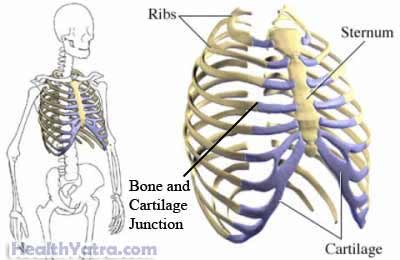Definition
Costochondritis is pain in the front of the chest wall. In particular, it is irritation where the bone and cartilage part of the ribs meet.
Sometimes there is also swelling and inflammation. This is a condition referred to as Tietze’s syndrome. Neither costochondritis nor Tietze’s syndrome is a serious disease. However, their symptoms are similar to those of several dangerous conditions, like aheart attack.

Causes
The cause of costochondritis is often not known. At other times, the condition can occur due to injury or overuse. Several types of arthritis may also affect this area.
Risk Factors
There are no known risk factors for costochondritis.
Symptoms
If you have any of these symptoms, do not assume it is due to costochondritis. These symptoms may be caused by other, serious health conditions such as heart attack, digestive problems, and bone cancer. See your doctor of you have any of these symptoms:
- Sharp, localized chest pain, which may be made worse by sneezing, coughing, deep breathing, or twisting motions of the chest
- Tenderness or swelling over a joint between ribs and breast bone
Diagnosis
Your doctor will ask about your symptoms and medical history. A physical exam will be done. Your doctor may do further tests if the diagnosis is not clear. Tests to examine the ribs more closely and to rule out other conditions may include:
- Chest x-ray—a test that uses radiation to take pictures of the chest
- Blood tests
- Electrocardiogram (ECG,EKG)—a test that records the heart’s activity by measuring electrical currents through the heart muscle to evaluate the heart
Treatment
Talk with your doctor about the best treatment plan for you. Most costochondritis will eventually go away on its own. Treatment is optional but choices include the following:
Hot or Cold Compresses
Compresses may help provide relief until the condition resolves itself. Try hot and cold compresses to see which is more helpful.
Over-the-Counter Analgesics
Your doctor may recommend some over the counter medicines. These may include aspirin, acetaminophen (Tylenol), ibuprofen (Advil, Motrin), or naproxen (Anaprox, Aleve).
Cortisone Injections
A local anesthetic and medication called cortisone may be injected directly into the area. This may be done if the discomfort does not respond to other treatments.
Prevention
Costochondritis occurs spontaneously at any age. It often occurs without warning or identified causes. There is no way to prevent it.
